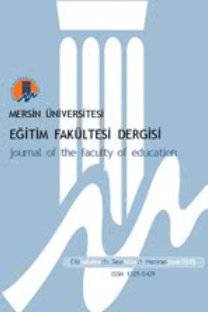The Factors that Mediate Preservice Science Teachers’ Understanding of Nature of Science
The purpose of the study is to explore the factors that mediate preservice science teachers’(PSTs) understanding of nature of science (NOS). This study was conducted during the LaboratoryApplication in Science II course and totally 50 PSTs joined the study voluntarily. The laboratory coursewas designed under the inquiry-based instruction. The design of the study was qualitative and exploratoryin nature. During the semester, reflection papers were collected to understand PSTs’ experiences with theintervention every week. At the end of the semester, semi-structured interviews were conducted todetermine the impact of the inquiry-based laboratory instruction. All of the data were analyzed at the endof the semester and determined factors that mediate PSTs’ NOS understanding. Findings revealed thatthree main factors; discussions and presentations, using inquiry skills, and doing inquiry-based laboratoryactivities were determined as factors that lead to development of PSTs NOS understanding. Furthermore,intervention also developed PSTs perspectives about teaching NOS
Anahtar Kelimeler:
Bilimin doğası, Araştırma temelli öğretim, Fen laboratuarı, Fen bilgisi öğretmen adayları
___
- Abd-El-Khalick, F. (2001). Embedding nature of science instruction in preservice elementary science courses: Abandoning scientism, but…Journal of Science Teacher Education, 12(3), 215-233.
- Abd-El-Khalick, F., & Akerson, V. L. (2004). Learning as conceptual change: Factors that mediate the development of preservice elementary teachers‘ views of nature of science. Science Education, 88(5), 785-810.
- Abd-El-Khalick, F. & Lederman, N. G. (2000). Improving science teachers‘ conceptions of nature of science a critical review of the literature. Journal of Science Education, 22(7), 665-701.
- Abd-El-Khalick, F., Bell, R. L., & Lederman, N. G. (1998). The nature of science and instructional practice: Making the unnatural natural. Science Education, 82(4), 417-436.
- Abruscato, J. (1995). Teaching children science: A discovery approach. Boston: Allyn and Bacon. Akerson, V. L., Abd-El-Khalick, F., & Lederman, N. G. (2000). Influence of a reflective explicit activitybased approach on elementary teachers‘ conceptions of nature of science. Journal of Research in Science Teaching, 37(4), 295-317.
- Alters, B.J. (1997). Whose Nature of Science? Journal of Research in Science Teaching, 34(1), 39-55. American Association for the Advancement of Science (AAAS). (1990). Science for all Americans. New York: Oxford University Press.
- American Association for the Advancement of Science (AAAS). (1993). Benchmarks for science literacy: A Project 2061 report. New York: Oxford University Press.
- Bartholomev, H., Osborne, J., & Ratcliffe, M. (2004). Teaching students 'ideas-about science': Five dimensions of effective practice. Science Education. 88, 655-682.
- Bell, R. (2008). Teaching the nature of science through process skills, Boston: Pearson/Allyn and Bacon. Bell, R.L., Lederman, N.G., & Abd-El-Khalick, F. (2000). Developing and acting upon one's conception of the nature of science: A follow-up study. Journal of Research in Science Teaching, 37(6), 563-581.
- Carin, A., Bass, J., & Contant, T. (2005). Methods for teaching science as inquiry. Upper Saddle River, NJ: Pearson.
- Domin, S. D., (2007). Students‘ perceptions of when conceptual development occurs during laboratory instruction. Chemistry Educational Research and Practice, 8(2), 140-152.
- Gabel, D. L., Rubba, P. A., & Franz, J. R. (1977). The effect of early teaching and training experience on physics achievement, attitudes toward science and science teaching, and process skill proficiency. Science Education, 61, 503-511.
- Khishfe, R., & Abd-El-Khalick, F. (2002). Influence of explicit and reflective versus inquiry-oriented instruction on sixth graders‘ views of nature of science. Journal of Research in Science Teaching, 39, 551-578.
- Lawson, A. E. (1982). The nature of advanced reasoning and science instruction. Journal of Research in Science Teaching, 19, 743-760.
- LeCompte, M., & Priessle, J. (1993). Ethnography and qualitative design in educational research. San Diego: Academic Press.
- Lederman, N. G. (1992). Students’ and teachers’ conceptions about the nature of science: A review of the research. Journal of Research in Science Teaching, 29, 331-359.
- Lederman, N. G. (1999). Teachers’ understanding of the nature of science and classroom practice: Factors that facilitate or impede the relationship. Journal of Research in Science Teaching, 36(8), 916-929.
- Lederman, N. G. (2007). Nature of science: Past, present, and future. In Abell, S. K., & Lederman, N. G. (Eds.), Handbook of research on science education (pp. 831-879). Mahwah, NJ: Lawrence Erlbaum Associates.
- Marshall, C., & Rossman, G. B. (2006). Designing qualitative research (4th ed.). Thousand Oaks, CA: Sage.
- Ministry of National Education. (2004). Elementary science and technology course curriculum. Ankara, Turkey: Ministry of Education.
- Yayın Aralığı: Yılda 3 Sayı
- Başlangıç: 2005
- Yayıncı: Mersin Üniversitesi Eğitim Fakültesi
Sayıdaki Diğer Makaleler
İlköğretim Öğretmenlerinin Sınıf İçi İstenmeyen Davranışlara İlişkin Görüşlerinin Karşılaştırılması
Burhan Çapri, Ayşe Balcı, Öner Çelikkaleli
Türkiye’de Öğrenim Gören Yabancı Uyruklu Lisans Öğrencilerinin Sosyo- Kültürel ve Ekonomik Sorunları
Kasım Kıroğlu, Alper Kesten, Cevat Elma
Bir Öfke Denetimi Eğitimi Programı’nın Üniversite Öğrencilerinin Sürekli Öfke Düzeylerine Etkisi
The Factors that Mediate Preservice Science Teachers’ Understanding of Nature of Science
Sinan Özgelen, Özgül Yılmaz Tüzün
